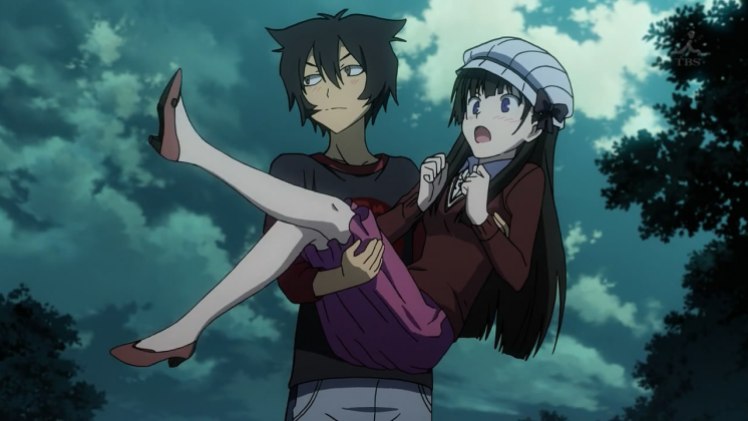Sankarea: Undying Love is a romantic comedy anime series that tells the tale of Chihiro Furuya, the teenage son of a temple priest and his chance meeting with Rea Sanka, the prized daughter of the Sanka family. However, unlike other anime rom-coms, there is one surprising twist; Chihiro is obsessed with the undead and is only interested in zombie girls. One would think that finding a zombie girlfriend is impossible, but when Chihiro’s cat, Babu, dies, he begins the process of creating a reanimation potion using a book he found, which inadvertently leads him to meet Rea, who contemplates committing suicide to escape from her misery. Rea steals some of the reanimation potion meant for Babu and thus becomes a zombie after an accident kills her in a rather violent way.
I love rom-coms, and I especially love anime rom-coms for its over dramatization of adolescent emotions and the struggles of unrequited love. I’m a sucker for a good love story but tragic love stories draw me in much more. There’s nothing like sitting on the edge of your seat, rooting for the guy to finally win the girl of his dreams or empathising with the loner girl who secretly longs for the popular guy to pay her some attention, all the while riding the emotional rollercoaster of wondering if the characters will overcome the many obstacles standing between them.
My initial reaction to Sankarea was 50/50. I’m not a zombie fanatic, yet alone interested in the horror genre so I was slightly hesitant to watch a young boy fall in love with a zombie. Upon watching the first few episodes, my hesitation toward watching this anime only grew. It wasn’t that the anime was bad. On the contrary, it had some powerful themes behind it and I’m sure that if you are as into zombies as Chihiro is, you’ll likely find this anime interesting.

As mentioned above, this anime is meant to be a romantic comedy and true to its genre there certainly is aspects of blossoming romance between the two lead characters. In many ways I enjoyed Chihiro’s kind nature and slight awkwardness. I certainly enjoyed the bits of humour involved in the story. What I struggled with, though, was the heavy theme of suicide and inappropriate behaviour of a father toward his daughter.
Rea’s father creeped me out and his mannerisms disturbed me. We come to learn about Rea’s misery and horrible predicament early on as she mentions to Chihiro that she felt trapped in her own home and longs to be a normal girl with a father who treats her as normal fathers do. We learn that Rea’s father has an unhealthy obsession with her, taking nude photos of her every year to ‘mark her growth’ and does not allow her to participate in normal activities out of fear that she will be tainted.

The way Sankarea depicts this ‘fatherly love’ was difficult to watch because it seemed very obvious that there was a lot more behind Rea’s father’s actions, one that any adult could easily identify and pick up on. No wonder Rea felt that the only way to live was to die. What’s worse is that there didn’t seem to be any other escape for Rea other than suicide due to the fact that her father was a powerful man. In fact, the only friend Rea ever truly had and who she’d confided in was sent away along with her family by Rea’s father. All of this appeared so be so blasé and casual. What lesson are we teaching if we show the audience that death is a lot better than life? Not to mention that this anime is uncensored so there may be bits and pieces that children should definitely not be exposed to.

Now, it’s imperative that you know that I haven’t finished this particular series so there may be much more to the story other than the fact that Rea dies, becomes a zombie and Chihiro, naturally, falls for her. Perhaps I’ll give this one another chance and keep watching just to see what happens. After all, this isn’t the first anime to take drastic measures to tell a compelling story or depict uncomfortable themes. To be fair, we should commend the creators of this anime for their courage in taking on such heavy going themes and mixing it with comedy, love and everydayness. Maybe what I felt was what they intended viewers to feel? What do you think?

